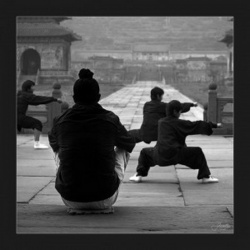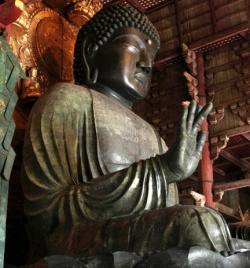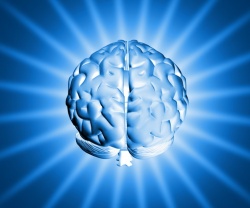Teachings of the BUDDHA : The Eight Consciousnesses
by Brother ChiSing July 8, 2012 - Dallas, Texas
Thank you, dear friends, for your beautiful practice tonight. This teaching of the 8 consciousnesses is based upon the Buddha's original teachings on consciousness, but expanded even further by later Buddhist disciples, especially in the later Mahayana tradition of Buddhism.
So, first, you all know about the five consciousnesses. Usually it is eyes, ears, nose, tongue, and skin. These are the forms of the body, but those are not yet the consciousnesses. Those are the organs through which the consciousness was perceived, right? So, there is also what is called eye consciousness, or we will call that seeing or vision. What are some fancier words? Smelling, tasting, touching.
But there is also the sixth consciousness, you know. We talk about it sometimes in Buddhist culture, the sixth sense. But truly it is very simple. Sixth sense is just simply mind consciousness. So, the Buddha talked about the sixth consciousness, which used the organs of perception (inaudible). Anyway, these are the organs of perception.
Now, what is interesting about the sixth consciousness is that you still have these six consciousnesses even when it you no longer are in this physical body. People who have near-death experiences, where their body dies in some way, their heart stops, or their brain dies or something, and then they have all of these perceptions. They can still see, hear, and all these other things, because that consciousness is not produced by the organs of the body. Consciousness perceives through them, but is not limited to them.
So, when we talk about the six consciousnesses, and these are just six different ways we perceive things. Usually we perceive them through the body, but as you develop, you are on the path of awakening, and at some point you may even start awakening the ability to perceive beyond the physical organs. This is what is called psychic abilities, so you can start seeing things, hearing things, perceiving things, even though it is not through the physical sense organs.
Now, it is very important to Buddhism that we develop certain other abilities before we start developing our psychic abilities, such as our ability to be wise and compassionate, to develop our lovingkindness, morality, ethical behavior, and develop our vow of wanting to be enlightened not just for ourselves, but so that we can serve all beings. So, we developed this. It is very important to develop all of this as a foundation because what can happen is if you start developing your psychic abilities in a very advanced way before you develop wisdom and compassion and ethical behavior, then you might misuse some of your abilities and harm people.
Now, in the Zen tradition, we try to deemphasize the cultivation of psychic abilities, but that does not mean that we do not believe that they exist or that they can be useful. In fact, one of the teacher wrote in one of her books how her psychic sensitivity was very, very heightened because of meditation practice over several years, and it came to a point where she knew what was for lunch before they were announcing what was for lunch. She just knew. But, she did not think much of it because, who cares? They're going to serve it anyway.
But, if you do develop a certain intuition in your practice and if you have a foundation in wisdom and compassion, you can actually use these developed consciousnesses, psychic abilities, for this service of your true heart's vow of helping others. For example, people who are in psychotherapy or counseling professions or in some way trying to listen to others, they can develop the ability to know things so that they can hone in on what the client really needs to help them. So, in other words, they can use their intuitive abilities to really kind of cut through all the stuff and go to the core issue for the person, and that is a good thing.
From time to time, I have experienced suddenly knowing something or suddenly sensing something and knowing what to say and how to say it for someone, for what someone was going through. So, it happens, and we all have these innate abilities that are not bound by just the physical senses. We can sense things beyond the physical.
At any rate, that is not really what I am trying to teach about today. I just thought I would share it with you. The sixth consciousness--but I talked about eighth consciousness, didn't I? So, if there is also another developed teaching later on called the ninth consciousness, but I do not know if we will get into that tonight.
So, beyond the six consciousnesses--let me just--thinking consciousness. Now, there is the eighth consciousness. So you have five here, six, and I will talk about seven in a minute. But the eighth consciousness is alaya consciousness, which get these sort of translated as store consciousness. Basically, where all of your experiences, memories, and everything is stored in sort of a memory bank. All the different things you have inherited from your ancestors as well as past lives and everything that is contained in that storehouse of all of your seeds of thoughts and potentialities, potentials.
So, that is store consciousness, alaya consciousness. Now, we have talked about 8, and so we have not mentioned the seventh yet. The seventh consciousness, according to Buddhist teachings, is sort of the culprits for our suffering and our unhappiness, because what happens is you perceive, even from the physical or nonphysical seeing, hearing, smelling, tasting, touching--you process it through the mind, which also functions with the brain and other parts of the body in thinking, processing, and of course you can also have thinking be without perceiving these other ways, too. That's why the mind is also its own consciousness, you know? Like, for instance, you're dreaming. When you are dreaming, you are creating all kinds of perceptions, but they are not from the physical eyes and other things like that.
So, the mind just makes thoughts happen, you know? So then it is understood and perceived in the thinking mind, and then it is stored in the store consciousness, and then whatever the store consciousness remembers from other things, it will bring it back into your conscious memory, your consciousness, your conscious mind from the subconscious mind. The problem is, there is a seventh consciousness between, which distorts what is perceived before it stores it through interpretation and then brings it back out through distortion, and so that is why we have so many problems. We are not really perceiving things truly as they are, but through a lens of distortion in the seventh consciousness.
So, I would call this the ego consciousness. The seventh consciousness is responsible for trying to see everything through the lens of me, mine, and my, and so everything is filtered and interpreted and put a value judgment on based on how it relates to me, my, or mine. This distorts it, because things are no longer just what they are. Now they are what they are in relation to how I feel about it or I perceive it in relation to me. So what happens is things in the world that are very, very pleasurable, we want to then grasp and own it. They are not just things. Like, a flower is not just a flower. It is like, I want that flower. It is mine. It is something to be possessed. It is no longer just a flower, you know? Or maybe it is something that, you know, someone--I don't know--the color blue, which I hate the color blue--now it is no longer just this color, but now it is in the evil color, right? Because that is how it is for me.
So, then of course, things that are neutral to me--so you have pleasurable things. Things that are unpleasant to me, I push away. Things that are pleasurable, I want to grasp. Neutral things, they do not even exist to me. I could care less. So even though each person in this room is very valuable in and of yourself, but if I filtered you through my perception of you in this seventh consciousness and I don't know who you are and I do not really care--I could care less--right? And we do that to everything. And yet, everything is precious, but we judge certain things as it doesn't matter and we ignore a lot of things in our universe. We ignore so much I could actually be of benefit to us.
So, the Buddha taught that our practice, then, is to transform the seventh consciousness, to transform this distorted sense of egoic self, and if we can transform that, then everything else will be fine, will function as it is. So, now, if you--be careful, though. This does not mean that our practice is to destroy the seventh consciousness. There is nothing actually bad about the ego self consciousness. It has a place and a function in our reality. The problem is that right now, it is in its immature form, and our practice is to bring it into its more mature form. I don't know if I am covering this up visually. Can you see it now? Okay.
So, we are not trying to destroy the ego. It has its place, but we want the ego to have its place in the context of a greater consciousness. Anything that came to me a few days ago--I heard something, and it just made a little bumper sticker kind of quote in my mind. I come up with some of those. I should probably create bumper stickers. Would you buy one? Brother ChiSing's bumper stickers. Anyway, from the ego self to eco self--from the ego self to eco self.
In other words, our practice is to get out of the limited, small minded ego individual self consciousness, separate individual consciousness, and to expand and awaken to our ecological oneness with everything, our interbeing, and that our true self is not this separate little self. Our true self is this plus all of you plus this planet, plus the solar system, plus this whole universe, plus all of the realms of infinite reality, whatever they are called. So this is our true self.
And so, as we practice, we awaken and become enlightened, and our ego then matures and becomes a true servant to our true nature. See, the problem right now is that the ego consciousness is just kind of--it kind of has a big head. It really thinks it is the boss. It is just a misperception of the way things really are, because our ego individual self is not the boss. It is the servant but the greater true self, this true nature. So, as we practice transformation, keep that in mind, because every time you perceive, see what happens a microsecond after perception, what kind of judgment--how are you relating to it from a small self point of view rather than just letting it be what it is? Just noticed how you immediately do that, and see that part of you that does that. That is the seventh consciousness.
So, through meditation and mindfulness, you can actually perceive it more clearly. That is why, you know, meditation is not just to make you peaceful. It is to help you to be able to see more clearly, and when you can perceive more clearly, you can then start transforming and letting go, letting go of that graspingness of the seventh consciousness.
One example of this is a couple of years ago, well, a couple of times in the past few years, I entered into a state of--maybe you might call it samadhi, just for a day or a few days. One actually happened, I guess last spring, for maybe a week or two, but anyway, it is just a state of oneness and bliss and nonresistance, and nothing could phase me. Someone could say something, and it would not bother me. Nothing could bother me. I just was like accepting, and I was letting go, and I was just being. It was great.
But because it happened a couple times before, this time, the last time, I was really trying to be mindful to see of moment when I would fall out of that state, okay? Because I already knew you cannot cling to it because you're going to come in and that out-of-state, whether they are great states are bad states or whenever. It is just impermanence. But I was using it now as a practice to be mindful. Okay, what makes it go? What makes me fall out of that state of oneness?
And this time I caught myself, and I realized that the moment I fell out, it was just terrible what I do, because it is like so blissful, so the contrast is just overwhelming. But the moment--instead of being upset about falling out of it, I was using it to practice. So why can I learn from this? Not, how should I cling to the state of bliss, but what can I learn about what I do in my mind that makes me come out of it? And I realized it was the very moment I said in my consciousness, "Mine! How dare you? Like, this is mine." It was seventh consciousness. And I saw very clearly, and then my energy went from this beautiful smoothness to raggedy and just like oh, no! It's like, I've got to defend myself.
So, ah! So this time instead of being upset about falling out of samadhi, I just used it to learn. Oh, okay. So every time I cling to me, mine, my in a separate, like this is mine versus this is yours, and I separate it, and I choose--there is a microsecond choice that you make in this time. So I was very, very glad, actually, that I learned something, and so anyway.
So that is what we can all do and should practice, is moment to moment, see when you start suffering. See if you can see what the thought is or the movement in your 7th consciousness. What is it that is doing it that precipitates that suffering? It happens so fast. You will not be able to catch it unless you practice mindfulness very consistently, and daily meditation is very helpful with that as well.
Now, this also relates to another teaching, which I will not go into tonight, but I will just give you a little preview. As I was meditating on this, I realized that this also corresponds to the Buddha's teachings on the five aggregates or the 5 composites of our human experience: form is the body, feelings is the sensations, thinking is the perception, and then mental formations and volition kind of go together in the ego, because they ego has its own kinds of ideas, and it also makes choices and how it relates to these ideas. And then, of course, store consciousness.
So, as we meditate and practice mindful living, we can fully start being mindful. First we start being mindful of the form. I am aware. I am mindful of the body. I am mindful of the breath. That is where we start, with the body and the breath, because it is easier. Because it is more tangible. But then as you start deepening your practice, you can start practicing with your feelings, as you feel and perceive things and think about things, and thoughts--looking at your thoughts--and then deeper, looking at your volition and understanding your whole consciousness.
Well, I hope this teaching was helpful to you. Just to let you know that there is a lot more to the practice then just, you know, sitting still and being peaceful. It is more about insight and wisdom, and that is very important, because what good is it if you are peaceful but not helpful? So, please be able to be helpful as well as peaceful. It is very important. Amitabha.
Transcribed by Jessica Hitch




